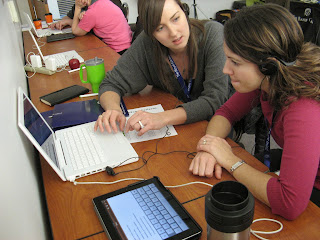 The Royal Conservatory (RCM) has spent the last 20 years responding to the this need through many facets of our programming, but none more so than through our game-changing, school-based, arts-infused education initiative known as Learning Through the Arts (LTTA).
The Royal Conservatory (RCM) has spent the last 20 years responding to the this need through many facets of our programming, but none more so than through our game-changing, school-based, arts-infused education initiative known as Learning Through the Arts (LTTA).Launched in 1994, LTTA seeks to expand the creative capacity of teachers to teach, students to learn, and schools to excel through a suite of proven-effective programs that make both teaching and learning engaging, meaningful, relevant, and fun. Our approach to arts-based education is known to:
• Improve student learning engagement, 21st-Century skills development, and academic achievement;
• Empower teachers with exciting new resources and instructional tools; and
• Enliven school communities by unleashing new collaborative capacity, intercultural understanding, and social vibrancy.
To date, we have achieved these objectives via a program model that bring specially-trained LTTA Artist-Educators into schools to partner with teachers in creating and delivering lesson plans that infuse the arts into learning the core curriculum (i.e. mathematics, science, language arts, and social studies.) This model involves a comprehensive service package that uses needs assessment, pre-planning sessions, in-class facilitation, program evaluation, professional training and development, and management expertise that altogether ensure ongoing effectiveness in delivering a high quality teaching and learning experiences.
Sizable investments in 1999-2000 ensured broad expansion of the LTTA Core program, allowing us to change the lives of even more children and youth across the country and around the world. As a result, today LTTA can boast a groundbreaking suite of six educational programs (and growing) that have reached over a million children and youth in over 12 countries.
In addition, we have over 65 research studies that can attest to our results. The latest findings from a 3-year intensive research study of LTTA in the Wood Buffalo Region of Alberta speak most definitively to the types of impacts the model can make. Grade 6-9 students who participated in this LTTA program achieved:
• Marked academic improvement in school subjects that were taught through LTTA, demonstrated by students’ routinely double-digit advances on school-based and provincial achievement tests (PATs) in the subjects of language arts, social studies, science, and mathematics.
• Deeper engagement in and greater enjoyment of the school subjects taught through LTTA.
• Broader appreciation for the arts and recognition of the importance of in-school arts experiences.
• Greater student belief in their own creativity.
• More comfort and prowess in the collaborative process involved in group work.
• Wider-spread preferences for arts-based learning as opposed to more traditional approaches.
Consequently, we are re-energized to redouble our efforts in preparing all young Canadians to positively contribute to a future where they must think critically, act collaboratively, embrace inclusivity, and encourage their inquisitiveness to deliver creative solutions to complex challenges, expressed with clarity and conviction.
Yet, despite LTTA’s past best attempts to expand program reach, we’re limited by our pre-existing delivery and dissemination model, which is based on a customized, high-touch approach that has pricing (and ongoing need for school subsidies) to match. While we continue to reach over 20,000 Canadian students each year, this number represents only 1% of Canada’s student population.
We have to do better.
In particular, we must look to how we can make our programming more accessible and affordable, especially to schools in more rural, northern and remote locations across the country, as well as those in more economically disadvantaged communities, and especially to Indigenous populations, where we have seen some of our greatest gains.
There really is no time to waste in providing all young people with the opportunity to become strong citizens and creative contributors to Canada’s prosperity. And so we must innovate once again to pursue new solutions.
Ultimately, we need to offer students exciting, fun, dynamic, and engaging ways to learn that reflect and connect to the mounting realities of their technology-saturated daily experiences. We need to offer teachers and schools the training, strategies, tools, and resources that create these types of learning environments in affordable, effective, and increasingly self-directed ways.
Our proposed response is to leverage LTTA’s expertise through internet technology to expand our programming towards a more digital model, so simple yet effective that it can be delivered anywhere, anytime. We feel that our proposal for an LTTA Digital prototype can do just this.
No comments:
Post a Comment